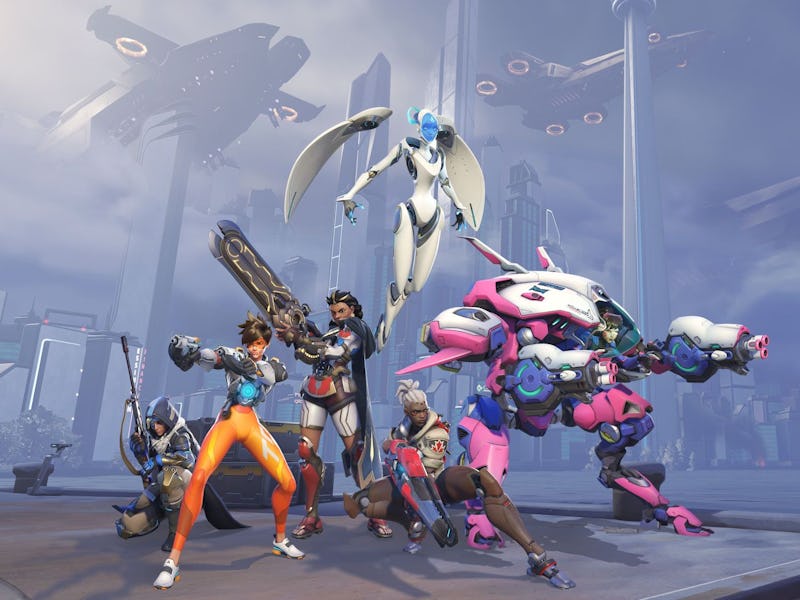Overwatch 2 Season 9 Could Be A Dark Time for the Game’s Healers
In Season 9, everyone is a healer.

Stop me if you’ve heard this one: Blizzard Entertainment is making massive changes to Overwatch 2 that lessen the importance of healers, and Support players aren’t happy. This time, the revision comes in the game’s Season 9 update, which introduces some of the biggest changes to damage and health in Overwatch history.
Starting with Season 9, most projectiles are growing slightly in size, meaning it will be easier to hit enemies. To balance that out, every Hero is getting a slightly larger health pool, which means that while weapons will feel more accurate, it won’t actually be quicker to take down targets. That’s all well and good, but Season 9 also gives every character in the game an automatic self-heal — which was announced in January — and they receive less healing from teammates while they’re being attacked.
Overwatch 2 Season 9 will make Damage dealers more self-reliant, but could erode the need for teamwork.
Together, those changes will make Overwatch’s healers less effective, while taking the game further from what made it great in the first place. The adjustments in Season 9 are meant to keep fights from going on too long and “enable more critical decision-making among the Damage and Support roles,” Blizzard said in a blog post announcing the update.
Maybe it’s because I’m a dedicated Support player — in Overwatch and nearly every other online game — but it’s hard to see this as giving Supports anything more than the short end of the stick. In a perfect world, the changes could encourage more strategic play from Damage Heroes, since pulling out of a fight lets you heal passively and increases how much healing Supports do. But it could just as easily incentivize Damage players to push further into enemy territory and hope their self-heal keeps them safe, while making Support players’ jobs harder while their teammates are in the line of fire.
More than just making Supports less effective, the suite of updates coming in Season 9 will fundamentally change how Overwatch 2 feels to play. Since its launch, Overwatch 2 has focused more on offensive play and individual skills than the original Overwatch. Supports and Tanks do more damage, an in-game scoreboard highlights who’s doing the most damage, and its smaller team size makes individual eliminations more important. Those changes all say that while Overwatch was about team-based objectives, Overwatch 2 is about individual performance.
Overwatch 2 emphasizes doing lots of damage, even for Support Heroes.
For players looking for a fast-paced shooter, that may be a good thing. But for people who long for a return to the good old days of Overwatch, the Season 9 changes drive home the fact that it’s not the same game anymore. At launch, Overwatch was brilliant. Its emphasis on teamwork and the inclusion of Heroes whose play style was far from typical shooter mechanics made it stand out from the likes of Call of Duty. Combined with its colorful cast of characters, its unique gameplay gained Overwatch legions of fans who had typically been left out of the shooter genre.
General consensus in the Overwatch 2 community seems to be that everyone on your team except for you is garbage. Damage players decry Supports for not healing enough, Supports lament Damage players sprinting away from the team then crying out for healing, and Tanks just wish anyone else was ever where they’re supposed to be. From that perspective, the healing changes make a lot of sense. Damage players now have an option for healing when their Supports are doing a bad job, and Supports could get some breathing room if a lone Damage Hero is capable of staying alive behind enemy lines.
The problem is that Overwatch was always meant to be a game that prioritized playing your role and cooperating with your team. If everyone can heal themselves, inflict high damage, and survive firefights on their own, no individual role is actually important.
A series of changes have made Support classes less distinct in Overwatch 2.
Since the launch of Overwatch 2, the game’s philosophy seems to be empowering individual players and making the distinctions between Heroes less significant, rather than playing up those differences to encourage teamwork. Designing changes that force people to work together is always going to be harder than ones that make them individually more powerful, since the former relies on players approaching the game as it’s meant to be played. If even a single player disregarding the team can ruin things for everyone, it makes sense on some level to make teamwork a suggestion rather than a rule.
So for most Overwatch 2 players, this may end up improving the experience. Anything that can keep Damage players alive despite a distracted healer and save Support players from being yelled at by rogue teammates is probably a good thing. But for players like me, it’s just another sign that this is not a game for us anymore. Blizzard says in its announcement that more Hero changes are on the way this season, and while they could alleviate some of my issues with the game, I’m not holding my breath. I hope the new era of Overwatch 2 is a good one for the people it’s catering to — I just wish I still saw room for players like me.
This article was originally published on